人教版八年级英语下册第五单元知识点归纳总结.doc
人教版八年级下册英语Unit5知识点总结
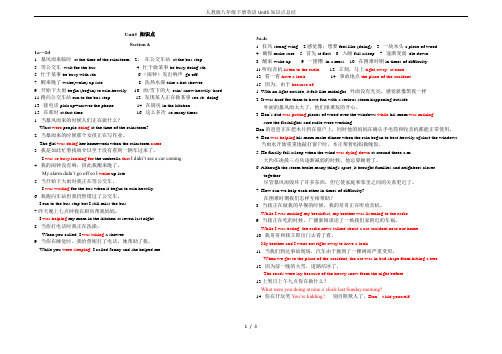
Unit5 知识点Section A1a—2d1. 暴风雨来临时at the time of the rainstorm 2、在公交车站at the bus stop3. 等公交车wait for the bus4. 忙于做某事be busy doing sth.5. 忙于某事be busy with sth.6.(闹钟)发出响声go off7. 醒来晚了wake(woke) up late 8. 洗热水澡take a hot shower9. 开始下大雨begin (began) to rain heavily 10. 雨/雪下的大rain/ snow heavily/ hard 11.跑向公交车站run to the bus stop 12. 发现某人正在做某事see sb. doing 13. 接电话pick up=answer the phone 14. 在厨房in the kitchen15. 在那时at that time 16. 这么多次so many times1. 当暴风雨来的时候人们正在做什么?What were people doing at the time of the rainstorm?2. 当暴雨来的时候那个女孩正在写作业。
The girl was doing her homework when the rainstorm came.3. 我是如此忙着找雨伞以至于没有看到一辆车过来了。
I was so busy looking for the umbrella that I didn’t see a car coming.4. 我的闹钟没有响,因此我醒来晚了。
My alarm didn’t go off so I woke up late.5. 当开始下大雨时我正在等公交车。
I was waiting for the bus when it began to rain heavily.6. 我跑向车站但我仍然错过了公交车。
人教版八年级下册英语Unit 5 知识点语法归纳总结
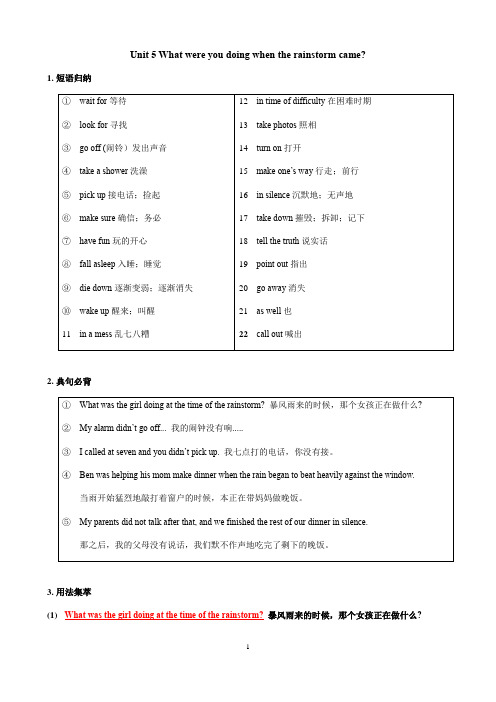
Unit 5 What were you doing when the rainstorm came?1.短语归纳2.典句必背3.用法集萃(1)What was the girl doing at the time of the rainstorm?暴风雨来的时候,那个女孩正在做什么?❖本句是特殊疑问句,时态是过去进行时,结构是“What+was/were+主语+doing+其他?”,用于询问某人在过去的某个时间正在做的事情。
例:—What were you doing at nine o’clock yesterday evening? 昨天晚上九点你正在做什么?—I was watching TV at home. 我正在家里看电视。
❖拓展:过去进行时描述过去某个时刻正在发生的动作或存在的状态,结构是“was/ were+动词的现在分词”。
例:When I got home my mother was cooking. 我到家的时候我妈妈正在做饭(2)My alarm didn’t go off... 我的闹钟没有响.....❖go off意为“(闹钟)发出响声”例:My alarm goes off at six every morning. 我的闹钟每天早晨6点响。
❖归纳:go off还有“离开”和“变质”之意。
例:Bob went off to get a drink. 鲍勃拿饮料去了。
Meat goes off quickly in hot weather. 热天肉变质得快。
❖拓展:go的短语(3)I called at seven and you didn’t pick up. 我七点打的电话,你没有接。
❖pick up意为“接电话”。
pick up有如下含义:(4)I called again at eight and you didn’t answer then either. 我八点再打来,你也没接。
人教版八年级英语下册第五单元知识点汇总总结
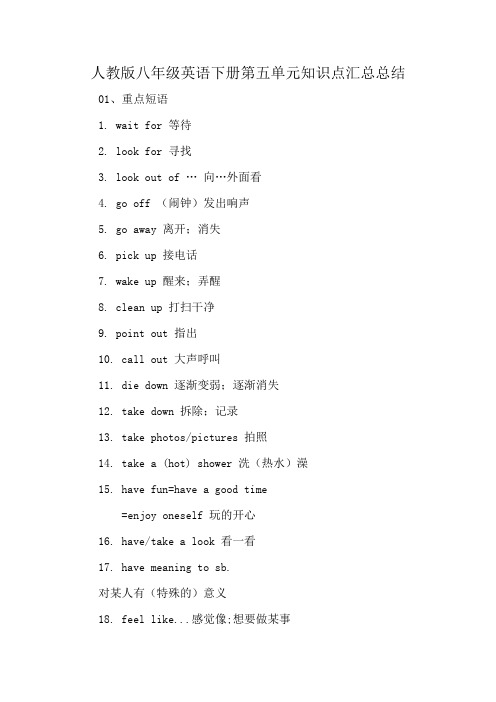
人教版八年级英语下册第五单元知识点汇总总结01、重点短语1. wait for 等待2. look for 寻找3. look out of … 向…外面看4. go off (闹钟)发出响声5. go away 离开;消失6. pick up 接电话7. wake up 醒来;弄醒8. clean up 打扫干净9. point out 指出10. call out 大声呼叫11. die down 逐渐变弱;逐渐消失12. take down 拆除;记录13. take photos/pictures 拍照14. take a (hot) shower 洗(热水)澡15. have fun=have a good time=enjoy oneself 玩的开心16. have/take a look 看一看17. have meaning to sb.对某人有(特殊的)意义18. feel like...感觉像;想要做某事19. make sure 务必,确保20. beat against 敲打21. fall asleep 进入梦乡22. break … apart 使…支离破碎23. turn on打开 (反:turn off关上)24. listen to the radio 听收音机25. get to = arrive in/at 到达26. make one’s way to 前往;费力前行27. to tell the truth 说实话28. walk by 路过29. at the time of …在…的时候30. in a mess 凌乱不堪;乱七八糟31. in times of difficulty 在困难时期32. because of 因为33. in history 在历史上34. in silence 沉默,无声35. at first 起初;起先36. by the side of …在…旁边37. the rest of …剩余的38. each other 互相39. for example 例如40. as well 也02、重点句子Grammar Focus 句子1. What were you doing at eight last night?昨天晚上8点你在做什么?I was taking a shower.我在洗淋浴。
人教八年级下Unit5知识点总结
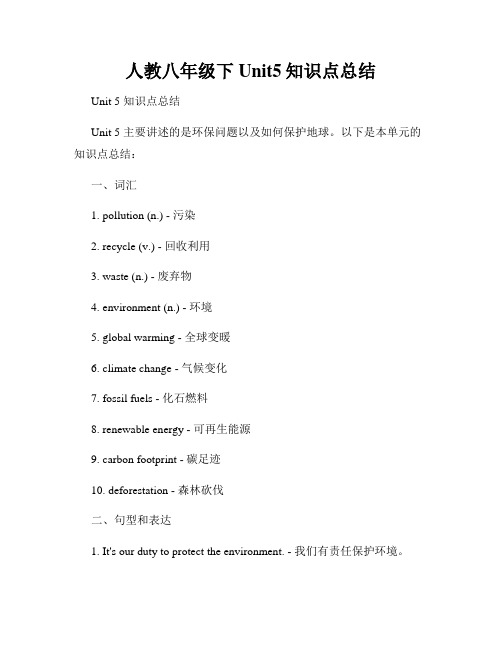
人教八年级下Unit5知识点总结Unit 5 知识点总结Unit 5 主要讲述的是环保问题以及如何保护地球。
以下是本单元的知识点总结:一、词汇1. pollution (n.) - 污染2. recycle (v.) - 回收利用3. waste (n.) - 废弃物4. environment (n.) - 环境5. global warming - 全球变暖6. climate change - 气候变化7. fossil fuels - 化石燃料8. renewable energy - 可再生能源9. carbon footprint - 碳足迹10. deforestation - 森林砍伐二、句型和表达1. It's our duty to protect the environment. - 我们有责任保护环境。
2. We should reduce, reuse, and recycle to save resources. - 我们应该减少、重复使用和回收利用以节约资源。
3. Global warming is a serious issue that we need to address. - 全球变暖是一个我们需要解决的严重问题。
4. Using renewable energy can help reduce carbon emissions. - 使用可再生能源可以帮助减少碳排放。
5. Deforestation leads to the loss of biodiversity. - 森林砍伐导致了生物多样性的丧失。
三、文章内容地球是我们的家园,保护环境是我们每个人的责任。
环境污染是地球面临的一个重大问题。
从空气污染到水污染,我们需要采取行动来减少污染物的排放。
例如,我们可以减少使用汽车、使用可再生能源以及回收和重复使用废物。
全球变暖和气候变化也是当前的重要议题。
最全面人教版八年级下册英语第五单元知识点归纳总结
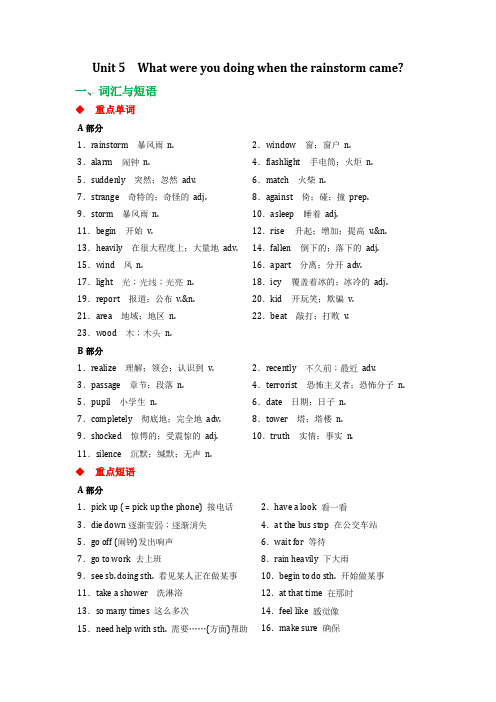
Unit 5 What were you doing when the rainstorm came?一、词汇与短语◆重点单词A部分1.rainstorm 暴风雨n.2.window 窗;窗户n.3.alarm 闹钟n.4.flashlight 手电筒;火炬n. 5.suddenly 突然;忽然adv.6.match 火柴n.7.strange 奇特的;奇怪的adj.8.against 倚;碰;撞prep. 9.storm 暴风雨n.10.asleep 睡着adj.11.begin 开始v.12.rise 升起;增加;提高v.&n. 13.heavily 在很大程度上;大量地adv.14.fallen 倒下的;落下的adj. 15.wind 风n.16.apart 分离;分开adv. 17.light 光;光线;光亮n.18.icy 覆盖着冰的;冰冷的adj. 19.report 报道;公布v.&n.20.kid 开玩笑;欺骗v.21.area 地域;地区n.22.beat 敲打;打败v.23.wood 木;木头n.B部分1.realize 理解;领会;认识到v.2.recently 不久前;最近adv. 3.passage 章节;段落n.4.terrorist 恐怖主义者;恐怖分子n. 5.pupil 小学生n.6.date 日期;日子n. 7.completely 彻底地;完全地adv.8.tower 塔;塔楼n.9.shocked 惊愕的;受震惊的adj.10.truth 实情;事实n. 11.silence 沉默;缄默;无声n.◆重点短语A部分1.pick up ( = pick up the phone) 接电话2.have a look 看一看3.die down逐渐变弱;逐渐消失4.at the bus stop 在公交车站5.go off (闹钟)发出响声6.wait for 等待7.go to work 去上班8.rain heavily 下大雨9.see sb. doing sth. 看见某人正在做某事10.begin to do sth. 开始做某事11.take a shower 洗淋浴12.at that time 在那时13.so many times 这么多次14.feel like 感觉像15.need help with sth. 需要……(方面)帮助16.make sure 确保17.with no light outside 外面没有灯光18.help sb. (to) do sth. 帮助某人做某事19.put……over……把……覆盖在……上20.make dinner 做晚饭21.put sth. on the table 把某物放在桌子上22.play a card game 玩纸牌游戏23.beat heavily against the windows 猛烈地敲打着窗户24.get to the place of the accident 到达事故发生地25.have fun 玩得愉快26.wake up 醒来;叫醒27.at first 起初;起先28.in times of difficulty 在困难时29.fall asleep 进入梦乡;睡着30.right away 立刻;马上31.go outside with sb. 和某人一起出去32.in the library 在图书馆33.find sth. in a mess 发现……一片狼藉34.on the street 在大街上35.break sth. apart 把某物折断(或分开)B部分1.in silence 沉默;无声2.in history 在历史上3.take down 拆除;往下拽;记录4.remember doing sth. 记得做过某事5.make one's way 前往;费力地前进6.look out of the window 向窗外看7.the school basketball competition 学校篮球比赛8.have meaning to sb.对某人来说有意义9.walk by 从旁边经过10.point sth. out to sb. 向某人指岀某物11.by the side of the road 在路边12.go away 离开13.at the event 在这次活动中14.as well 也15.be late for 迟到16.call out the winner 宣布获胜者17.on this day 在这一天18.10 minutes ago 十分钟前19.on April 4 在四月四日20.be completely shocked 完全震惊了21.an important event 一次重要的事件22.the rest of 其余的23.on the radio 在收音机上◆重点句子A部分1.What were people doing yesterday at the time of the rainstorm?昨天暴风雨来临时人们正在干什么?2.when the rain storm suddenly came, what were you doing?当暴风雨突然来临时,你正在做什么?3.So while you were sleeping, I called Jenny and she helped me.因此在你睡觉的时候,我打电话给珍妮,她帮了我。
人教版英语八年级下册第五单元语法重点
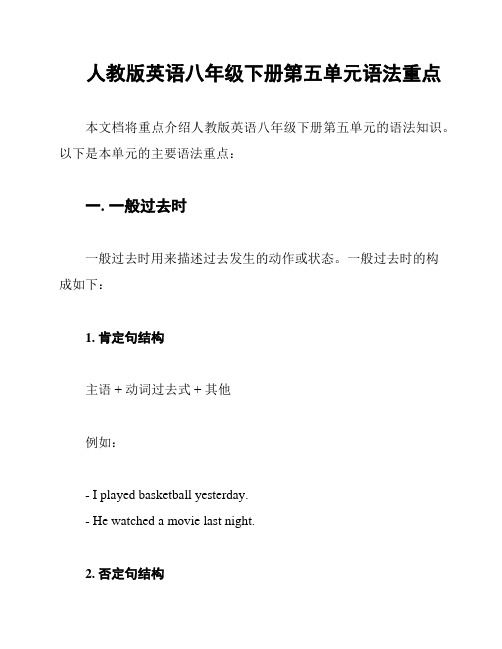
人教版英语八年级下册第五单元语法重点本文档将重点介绍人教版英语八年级下册第五单元的语法知识。
以下是本单元的主要语法重点:一. 一般过去时一般过去时用来描述过去发生的动作或状态。
一般过去时的构成如下:1. 肯定句结构主语 + 动词过去式 + 其他例如:- I played basketball yesterday.- He watched a movie last night.2. 否定句结构主语 + did not + 动词原形 + 其他例如:- I did not play basketball yesterday. - He did not watch a movie last night.3. 疑问句结构Did + 主语 + 动词原形 + 其他?例如:- Did you play basketball yesterday? - Did he watch a movie last night?二. 现在进行时现在进行时用来描述目前正在发生的动作。
现在进行时的构成如下:1. 肯定句结构主语 + am/is/are + 动词-ing + 其他例如:- She is reading a book now.- We are playing soccer at the moment.2. 否定句结构主语 + am not/is not/are not + 动词-ing + 其他例如:- She is not reading a book now.- We are not playing soccer at the moment.3. 疑问句结构Am/is/are + 主语 + 动词-ing + 其他?例如:- Is she reading a book now?- Are we playing soccer at the moment?三. 过去进行时过去进行时用来描述过去某一时刻正在进行的动作。
过去进行时的构成如下:1. 肯定句结构主语 + was/were + 动词-ing + 其他例如:- They were studying English at 8 p.m. yesterday.- He was playing video games when I called him.2. 否定句结构主语 + was not/were not + 动词-ing + 其他例如:- They were not studying English at 8 p.m. yesterday. - He was not playing video games when I called him.3. 疑问句结构Was/were + 主语 + 动词-ing + 其他?例如:- Were they studying English at 8 p.m. yesterday?- Was he playing video games when I called him?以上是人教版英语八年级下册第五单元的语法重点。
人教版八年级下册英语Unit5知识点总结

人教版八年级下册英语Unit5知识点总结一、语法知识点A部分知识点1.过去进行时❶ 去进行时的构成及用法过去进行时由“助动词(was/were)+动词-ing”构成,表示在过去某一时刻或某一时间段正在进行的动作。
这一特定的过去时间除有上下文暗示以外,一般用过去的时间状语来表示。
如:then, at that time, at this time yesterday, at 10:00 yesterday morning, all right以及when/while从句等。
❶ 表示过去时间点正在进行的动作。
此时常伴明确的过去时间点等。
eg:She was reading a book at this time yesterday.昨天这个时候她正在看书。
(过去时间点正在进行的动作)I was watching TV then. 那时我正在看电视。
(过去时间点正在进行的动作)❶ 表示过去的某个阶段持续的动作。
eg:She was watching TV when the phone rang.(过去一段时间内持续的动作)她正在看电视,这时电话铃响了。
❶ 表示这一阶段反复发生的动作,带有褒贬感情色彩。
此时常伴有频度副词always等。
eg:The girl was always changing her mind.(过去反复发生的动作,带有感情色彩)这个女孩老是改变主意。
❶ 表示过去动作延迟到以后发生,即用过去进行表过去将来,此类动词是一些位置的变化的词。
eg:He told me that he was going soon.(过去进行表将来)他告诉我他很快就要走了。
❶ 过去进行时的一般疑问句句型:Be(Was/Were)+主语+现在分词+其他?肯定回答:Yes,主语+be(was/were).否定回答:No,主语+be(was/were) not.eg:--Were you cooking at that time? 那时,你在做饭吗?--Yes, I were.是的。
Units5-6单元高频考点总结2023-2024学年人教版英语八年级下册

八下5-6单元高频考点1. I called at seven and you didn 't pick up.我七点给你打电话但是你没接。
知识点:pick up 接电话1)pick up 意为“接电话”,相当于pick up the phone.2)pick up还有“捡起;(用车)接人”之意,属“动词+副词”型短语,名词作宾语,既可置于中间,也可置于up之后;但代词作宾语必须置于中间。
2.Ben was helping his mom make dinner when the rain began to beat heavily against the window.当雨开始猛烈地击打窗户的时候,本正帮着母亲做晚餐。
知识点:against的用法:against prep.倚;碰;撞1)against 意为“倚;碰;撞”,常与行为动词连用。
2)against意为“反对”,其反义词为for,意为“赞成”。
常用结构:be against(doing)sth.反对(做)某事。
例句:The rain was beating against the window.雨点敲打着窗户。
Are most people against the suggestion?大多数人反对这条建议吗?3.He finally fell asleep when the wind was dying down at around 3:00 a.msleep①动词,“睡觉”②名词,“睡觉;睡眠”,不可数sleepy形容词,“想睡觉的;困倦的”asleep形容词,“睡着的”,只作表语sleeping形容词或现在分词,意为“正在睡觉的”,常置于名词前作定语或用于进行时态4. This story reminds us that you can never know what 's possible unless you try to make it happen.这个故事提醒我们:你永远不会知道什么是可能的,除非你努力使它发生。
(完整版)人教版新目标八年级下册英语Unit5知识点

(完整版)人教版新目标八年级下册英语Unit5知识点人教版新目标八年级下册英语Unit5知识点Unit 5内容简介本单元主要介绍了关于过去事件的讨论和描述。
学生研究了过去完成时的用法,掌握了过去完成时态的构成、肯定句、否定句和疑问句的用法,并通过例句和练加深了对过去完成时的理解。
同时,学生还研究了如何根据图片提示以及其他相关信息准备口头报告。
Unit 5知识点总结1. 过去完成时态(Past Perfect Tense)- 过去完成时态表示在过去某一时间或动作之前已经发生或完成的动作或状态。
- 构成:had + 过去分词(had是过去完成时的助动词,根据主语变化,后接过去分词构成谓语)- 肯定句结构:主语 + had + 过去分词 + 其他- 否定句结构:主语 + hadn't + 过去分词 + 其他- 疑问句结构:Had + 主语 + 过去分词 + 其他?2. 过去完成时态的用法- 用于表示已经发生或完成的动作或状态,强调动作发生在过去某个时间之前。
- 指示两个过去发生的动作中,先发生的动作使用过去完成时,后发生的动作使用一般过去时。
Unit 5附加题目请回答以下问题:1. 过去完成时态的构成是什么?2. 过去完成时态的肯定句结构是什么?3. 过去完成时态可以用来表示什么?问题回答1. 过去完成时态的构成是had + 过去分词。
2. 过去完成时态的肯定句结构是主语 + had + 过去分词 + 其他。
3. 过去完成时态可以用来表示在过去某一时间或动作之前已经发生或完成的动作或状态。
人教版英语八年级下册第五单元知识点总结
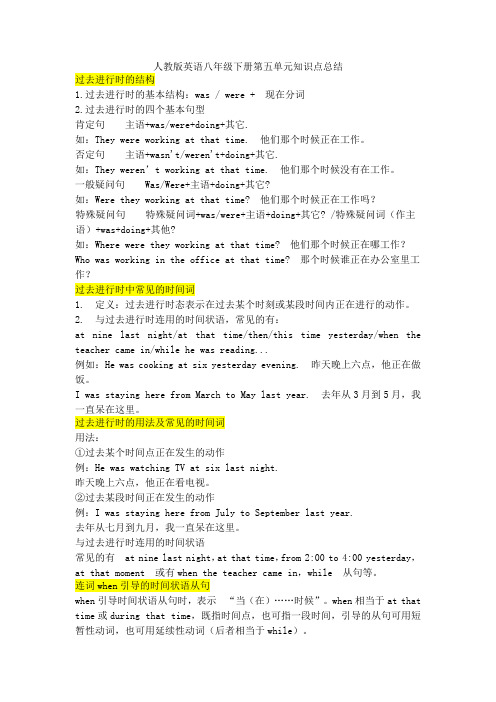
人教版英语八年级下册第五单元知识点总结过去进行时的结构1.过去进行时的基本结构:was / were + 现在分词2.过去进行时的四个基本句型肯定句主语+was/were+doing+其它.如:They were working at that time. 他们那个时候正在工作。
否定句主语+wasn't/weren't+doing+其它.如:They weren’t working at that time. 他们那个时候没有在工作。
一般疑问句Was/Were+主语+doing+其它?如:Were they working at that time? 他们那个时候正在工作吗?特殊疑问句特殊疑问词+was/were+主语+doing+其它? /特殊疑问词(作主语)+was+doing+其他?如:Where were they working at that time? 他们那个时候正在哪工作?Who was working in the office at that time? 那个时候谁正在办公室里工作?过去进行时中常见的时间词1. 定义:过去进行时态表示在过去某个时刻或某段时间内正在进行的动作。
2. 与过去进行时连用的时间状语,常见的有:at nine last night/at that time/then/this time yesterday/when the teacher came in/while he was reading...例如:He was cooking at six yesterday evening. 昨天晚上六点,他正在做饭。
I was staying here from March to May last year. 去年从3月到5月,我一直呆在这里。
过去进行时的用法及常见的时间词用法:①过去某个时间点正在发生的动作例:He was watching TV at six last night.昨天晚上六点,他正在看电视。
人教版英语八年级下册英语第5单元知识点归纳

人教版英语八年级下册英语第5单元知识点归纳Unit 5: What were you doing when the rainstorm came?When you arrive at a small place。
use "arrive at"。
Whenyou arrive at a big place。
use "arrive in" or "reach" or "get to"。
For example。
"I arrived in Beijing last night" can also be said as"I reached Beijing last night" or "I got to Beijing last night"。
If the object is an adverb like "here"。
"there"。
or "home"。
you canomit "at/in/to"。
For instance。
"arrive here/there/home".Use "in front of" to describe something in front of a place beyond a certain range。
Use "in the front of" to describe something in front of a place within a certain range。
For example。
"There are some big trees in front of the classroom building" means that there are some big XXX"I like sitting in the front of the taxi" means that I like sitting in the front seat of the taxi.Take off" has three meanings。
人教版八年级下册英语Unit 5单元语法知识点总结
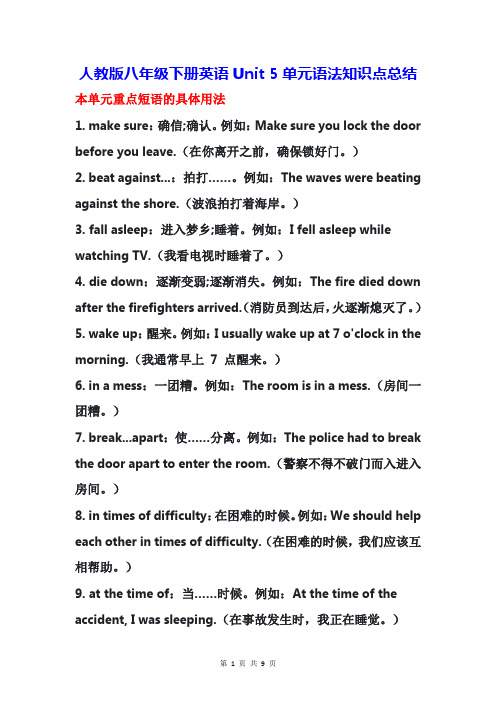
人教版八年级下册英语Unit 5单元语法知识点总结本单元重点短语的具体用法1. make sure:确信;确认。
例如:Make sure you lock the door before you leave.(在你离开之前,确保锁好门。
)2. beat against...:拍打……。
例如:The waves were beating against the shore.(波浪拍打着海岸。
)3. fall asleep:进入梦乡;睡着。
例如:I fell asleep while watching TV.(我看电视时睡着了。
)4. die down:逐渐变弱;逐渐消失。
例如:The fire died down after the firefighters arrived.(消防员到达后,火逐渐熄灭了。
)5. wake up:醒来。
例如:I usually wake up at 7 o'clock in the morning.(我通常早上7 点醒来。
)6. in a mess:一团糟。
例如:The room is in a mess.(房间一团糟。
)7. break...apart:使……分离。
例如:The police had to break the door apart to enter the room.(警察不得不破门而入进入房间。
)8. in times of difficulty:在困难的时候。
例如:We should help each other in times of difficulty.(在困难的时候,我们应该互相帮助。
)9. at the time of:当……时候。
例如:At the time of the accident, I was sleeping.(在事故发生时,我正在睡觉。
)10. go off:(闹钟)发出响声。
例如:The alarm went off at 6 o'clock.(闹钟在6 点钟响了。
完整word版本初中八年级的下册的英语第五单元总结复习学习知识点整理

八年下册英第五元知点整理一,文重点解:1. If you go to the party, you'll have a good time.条件状从句常由附属if,unless 等引。
和状从句一,一般在而不用将来,尤其注意主第三人称数,使用数形式。
条件状从句用if 引的条件状从句的构:if+ 一般在,主+将来。
2.I think I'm going to wear jeans to the party.If you do, the teacher won't let you in.〔 1〕 do 用作代,代替上文的局部“wear jeans to the party 〞 ,防止重复。
(2〕 let in 意“ ⋯⋯ 来〞Windows let in light and air.3.Today is too early. If we have it today, half the class won't come.(1〕 too“太⋯〞 ,否认含。
〔 2〕class 此指全班同学。
half a/an, a half, half the后接名,表示“一半〞.He ran half a mile / a half mile in half an hour.I have finished half the book.注意表“半个⋯〞或“⋯个半〞,half一的用法。
half an hour 半小, half a year 半年, one year and a half 一年半, one and a half years 一年半, five and half days 五天半4. We can all meet and watch a video.meet 碰头,聚集,见面,watch a video 看录像5.Some students will be bored.be bored, get bored 疲乏的,厌倦的bored 指人的状态,主语为人“厌乏的〞I'll get bored if I read English for a long time.The TV play is too boring.I'm not interested in such boring stories.6.When is a good time to have the party?Let's have it today.“to have the party〞是不定式作定语修饰名词 time.不定式作定语通常要放在所修饰的名词或代词之后。
人教版八年级英语下册第五单元知识点总结
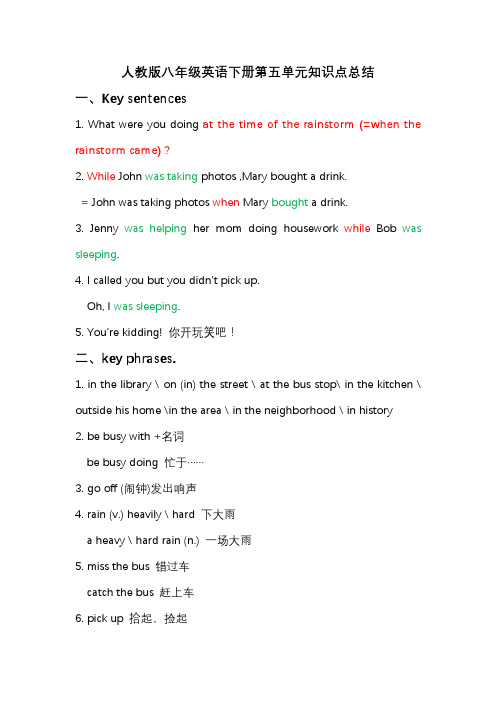
人教版八年级英语下册第五单元知识点总结一、Key sentences1. What were you doing at the time of the rainstorm (=when the rainstorm came) ?2. While John was taking photos ,Mary bought a drink.= John was taking photos when Mary bought a drink.3. Jenny was helping her mom doing housework while Bob was sleeping.4. I called you but you didn’t pick up.Oh, I was sleeping.5. You’re kidding! 你开玩笑吧!二、key phrases.1. in the library \ on (in) the street \ at the bus stop\ in the kitchen \ outside his home \in the area \ in the neighborhood \ in history2. be busy with +名词be busy doing 忙于……3. go off (闹钟)发出响声4. rain (v.) heavily \ hard 下大雨a heavy \ hard rain (n.) 一场大雨5. miss the bus 错过车catch the bus 赶上车6. pick up 拾起,捡起pick up the phone = answer the phone 接电话pick sb up 开车接某人7. bring sth together 把某物聚在一起bring sb together 把某些人聚到一起;使某些人团结起来8. make sure 尽力做到; 确保; 务必be sure 相信;确信9. make \ cook dinner 做晚饭10. beat against 拍打11. at first 起先(下文要转折,first 强调顺序)12. fall \go asleep =go \get to sleep 入睡13. die down 减弱;平息14. at around \ about 3 o’clock 在大约三点15. break...apart 分裂;解体16. by the side of the road 在路边17. walk by 走路经过18. be \ get killed 被谋杀;被害19. the rest =the other \others 剩下;剩余20. in silence 沉默21. take down 1) 摧毁;拆除2)取下;记下22. have meaning to 对……有意义23. look out 小心;当心look out of 向…… 外看24. by sb 被某人;由某人25. tell the truth 说实话tell a lie 说谎26. as well 也27. couldn’t \wouldn’t believe 难以相信28. make one's way to.... 在某人去……的路上29. in a mess 一团糟;乱七八糟30. the Animal Helpline 动物保护热线the World Trade Center 世贸中心31 point out 指出point at 指向(近)point to 指向(远)32. remember doing sth. 记得做过某事remember to do sth. 记得去做某事33. join sb to do (join sb for +n) 和某人一起做某事33. Recycling :wait for \ wake up \ look for \ take a shower \ help with \pieces of \ feel like \ play a card game \ for example \ have a look\ have trouble (in) doing sth. =have problems/difficulty (in) doing sth做某事有困难或麻烦三、key points1. 辨析:when while(1)表示“当……的时候”,如后面连接的动词为进行时态,则用while多于用when。
人教版八年级英语下册Unit5重难点知识总结
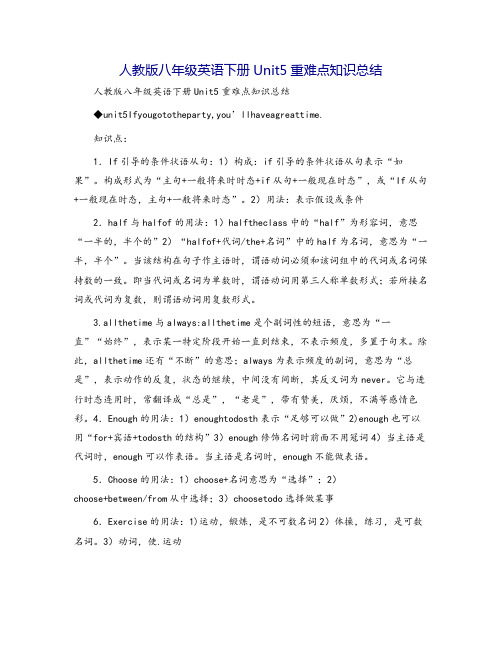
人教版八年级英语下册Unit5重难点知识总结人教版八年级英语下册Unit5重难点知识总结◆unit5Ifyougototheparty,you’llhaveagreattime.知识点:1.If引导的条件状语从句:1)构成:if引导的条件状语从句表示“如果”。
构成形式为“主句+一般将来时时态+if从句+一般现在时态”,或“If从句+一般现在时态,主句+一般将来时态”。
2)用法:表示假设或条件2.half与halfof的用法:1)halftheclass中的“half”为形容词,意思“一半的,半个的”2)“halfof+代词/the+名词”中的half为名词,意思为“一半,半个”。
当该结构在句子作主语时,谓语动词必须和该词组中的代词或名词保持数的一致。
即当代词或名词为单数时,谓语动词用第三人称单数形式;若所接名词或代词为复数,则谓语动词用复数形式。
3.allthetime与always:allthetime是个副词性的短语,意思为“一直”“始终”,表示某一特定阶段开始一直到结束,不表示频度,多置于句末。
除此,allthetime还有“不断”的意思;always为表示频度的副词,意思为“总是”,表示动作的反复,状态的继续,中间没有间断,其反义词为never。
它与进行时态连用时,常翻译成“总是”,“老是”,带有赞美,厌烦,不满等感情色彩。
4.Enough的用法:1)enoughtodosth表示“足够可以做”2)enough也可以用“for+宾语+todosth的结构”3)enough修饰名词时前面不用冠词4)当主语是代词时,enough可以作表语。
当主语是名词时,enough不能做表语。
5.Choose的用法:1)choose+名词意思为“选择”;2)choose+between/from从中选择;3)choosetodo选择做某事6.Exercise的用法:1)运动,锻炼,是不可数名词2)体操,练习,是可数名词。
Unit-5单元知识点归纳总结 人教版英语八年级下册

Unit 5 Do you want to watch a game show?●Part 2 knowledge List --Section A【考点1】don't mind不介意,不在乎mind (1)v.介意,在乎。
后面常跟名词、代词、动名词或从句(if\whether引导),常用在否定句、疑问句和条件句中。
Eg:Would you mind opening the door?你介意打开门吗?Let me help you,if you don't mind.如果你不介意,让我来帮你吧。
Do you mind if I smoke here?你介意我在这儿抽烟吗?(2)n.想法,意见,精神,心body and mind身心He always reads others' mind.他总能看透别人的心思。
[拓展]:与mind/有关的短语make up one's mind to do 下定决心做某事change one's mind改变主意Keep...in mind 记住·····Keep one's mind on专心于,专注于never mind没关系,不要记在心上选择填空1. ---Father is sleeping. Would you mind the TV, Tom?---Not at all. I'll do it right away.A. turning downB. to turn onC. turning upD. turn off2. ---Do you mind if I sit here?--- .It's for Miss Liu.A. Not at allB. Never mindC. Of course notD. Better not【考点2】can't stand无法忍受stand(1)vt.容忍,忍受(=bear),尤其用于否定句或疑问句中,强调不喜欢,常与can\could 等情态动词连用。
人教版本初中八年级的英语第五单元总结复习学习知识点.docx

Unite 5 What were you doing when the rainstorm came?一、重点短1. make sure 确信 ;确2. beat against... 拍打⋯⋯3. fall asleep 人梦;睡着4. die down 逐弱;逐消失5. wake up 醒来6. in a mess 一糟7. break.. . apart 使⋯⋯分离8. in times of difficulty 在困的候9. at the time of 当.......候10. go off ()出响声11. take a hot shower 洗水澡12. miss the bus 公交13. pick up 接14. bring... together 使⋯⋯靠15. in the area 在个地区16. miss the event 个事件17. by the side of the road 在路 18. the Animal Helpline 物保19. walk by 走路 20. make one ’s way 在to某.人去⋯⋯的路上21. hear the news 听到个消 22. important events in history 史上的重大事件23. for example 例如24.be killed 被害25. over 50 5 0多()26. a school pupil 一个小学生27. on the radio 通广播28. in silence 沉默 ;无声29. more recently 最近地 ;新近 30. the World Trade Center 世中心31.take down 拆除 ;摧32. have meaning to ⋯⋯ 有意33. remember doing sth. 得做某事34. at first 首先 ;最初二.法解1.What was/were+主 +doing+其他?某人在去的某个正在做某事。
英语八年级下(人教版)第五单元重点知识总结
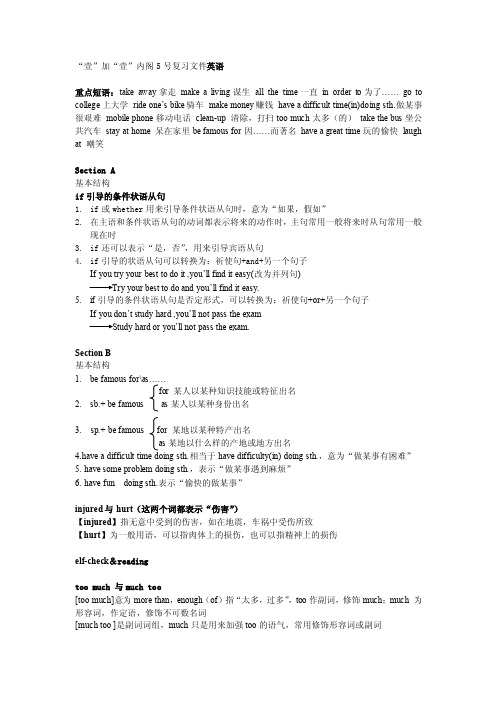
“壹”加“壹”内阁5号复习文件英语重点短语:take away拿走make a living谋生all the time一直in order to为了……go to college上大学ride one’s bike骑车make money赚钱have a difficult time(in)doing sth.做某事很艰难mobile phone移动电话clean-up 清除,打扫too much太多(的)take the bus坐公共汽车stay at home 呆在家里be famous for因……而著名have a great time玩的愉快laugh at 嘲笑Section A基本结构if引导的条件状语从句1.if或whether用来引导条件状语从句时,意为“如果,假如”2.在主语和条件状语从句的动词都表示将来的动作时,主句常用一般将来时从句常用一般现在时3.if还可以表示“是,否”,用来引导宾语从句4.if引导的状语从句可以转换为:祈使句+and+另一个句子If you try your best to do it ,you’ll find it easy(改为并列句)Try your best to do and you’ll find it easy.5.if引导的条件状语从句是否定形式,可以转换为:祈使句+or+另一个句子If you don’t study hard ,you’ll not pass the examStudy hard or you’ll not pass the exam.Section B基本结构1.be famous for\as……for 某人以某种知识技能或特征出名2.sb.+ be famous as某人以某种身份出名3. sp.+ be famous for 某地以某种特产出名as某地以什么样的产地或地方出名4.have a difficult time doing sth.相当于have difficulty(in) doing sth.,意为“做某事有困难”5. have some problem doing sth.,表示“做某事遇到麻烦”6. have fun doing sth.表示“愉快的做某事”injured与hurt(这两个词都表示“伤害”)【injured】指无意中受到的伤害,如在地震,车祸中受伤所致【hurt】为一般用语,可以指肉体上的损伤,也可以指精神上的损伤elf-check&readingtoo much 与much too[too much]意为more than,enough(of)指“太多,过多”,too作副词,修饰much;much 为形容词,作定语,修饰不可数名词[much too ]是副词词组,much只是用来加强too的语气,常用修饰形容词或副词听写;黑体单词:。
- 1、下载文档前请自行甄别文档内容的完整性,平台不提供额外的编辑、内容补充、找答案等附加服务。
- 2、"仅部分预览"的文档,不可在线预览部分如存在完整性等问题,可反馈申请退款(可完整预览的文档不适用该条件!)。
- 3、如文档侵犯您的权益,请联系客服反馈,我们会尽快为您处理(人工客服工作时间:9:00-18:30)。
Unit5 what were you doing when the rainstorm came? 短语归纳
1.wait for 等待
2.look for 寻找
3.go off (闹铃)发出声音
4.take a shower 洗澡
5.pick up 接电话;捡起
6.make sure 确信;务必
7.have fun 玩的开心8.fall asleep入睡;睡觉
9.die down 逐渐变弱;逐渐消失10.wake up 醒来;叫醒
11.in a mess 乱七八糟12.take photos 照相
13.turn on 打开14.in silence 沉默地;无声地
15.take down摧毁;拆卸;记下16.tell the truth 说实话
17.point out 指出18.go away 消失
19.as well 也
用法归纳
1.be busy doing sth/be busy with sth 忙于(做)某事
2.see sb /sth doing sth 看见某人或某物正在做某事
3.begin/start to do sth 开始做某事
4.try to do sth 努力去做某事
5.have trouble(in)doing sth做某事有困难
语法点
过去进行时
过去进行最好记,was/were+doing
特定时间有暗示,过去某刻某时段
肯定主语在句首,一般问句Be提前
否定句式更简单,Be后只把not添。
